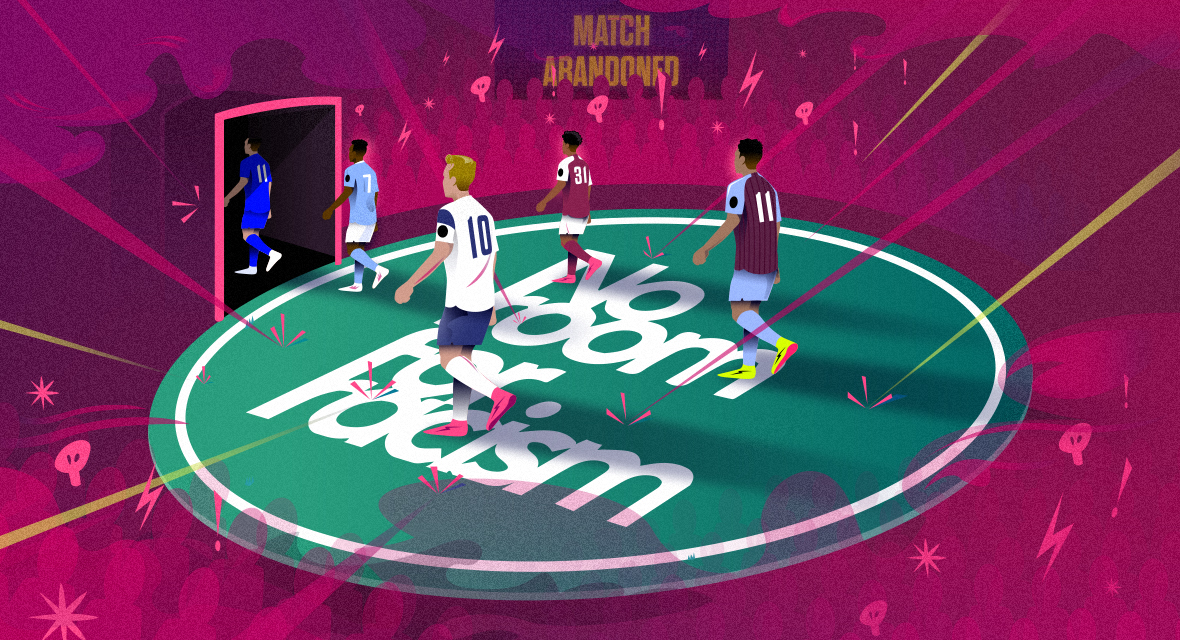Stamping out racism in the stands – are football’s matchday protocols working?
Introduction
Football is reflective of society, and as such, continues to provide a venue for racism. Kickitout statistics for the 2018/19 season indicate that race is the most common form of discrimination in both professional and grassroots football, representing 65% of reports. Depressingly, the latest data published by Kickitout indicates that reports of racism rose significantly in the 2019/20 season.
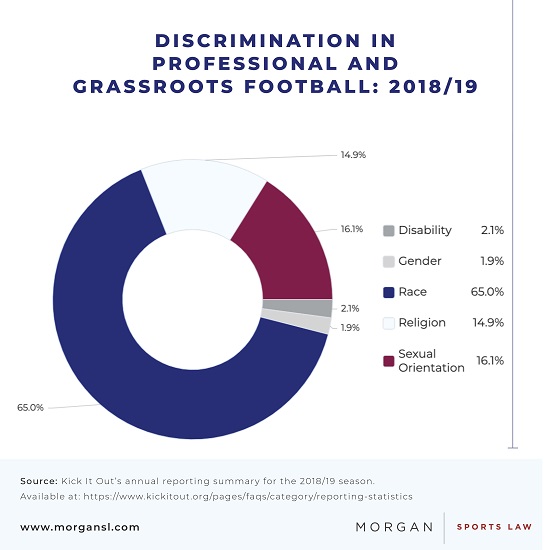
George Floyd’s killing, and the wider issues that have arisen from it, have put a spotlight on the way that all corners of society deal with racism – sports and football being no exception. This article considers the matchday protocols operated by football authorities to tackle racist abuse from the stands, and whether they are enough.
Protocols
It will eventually become safe for spectators to return to football matches. Whilst that will of course bring many positives, it will also mean the return of discriminatory abuse from a small minority of fans. Prior to the start of the 2019/20 season, FIFA’s Secretary General, Fatima Samoura, issued a circular urging all member associations, leagues, clubs and disciplinary bodies to introduce FIFA’s three-step procedure for dealing with abuse in their domestic competitions. UEFA has a similar three-step protocol. The Premier League and The FA’s operate a six-step protocol, which has some notable differences from the three-step procedure advocated by FIFA.
Summaries of the FIFA, UEFA and The FA protocols are set out, by way of comparison, in the table below. Each protocol prescribes the steps to be taken when discriminatory abuse by spectators is identified. In all cases the protocol potentially leads to the abandonment of the game:
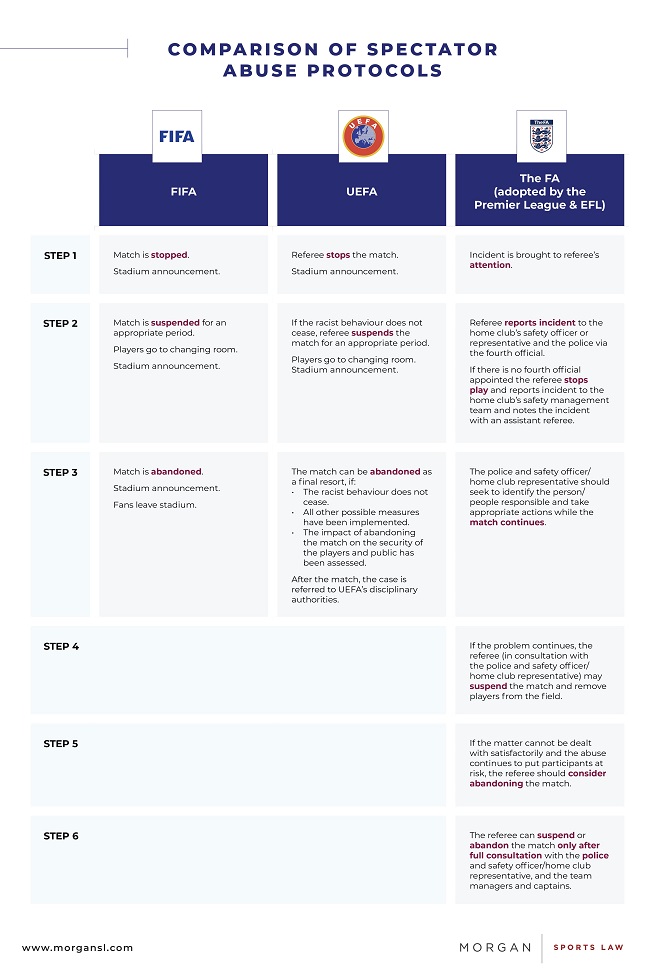
Are the protocols fit for purpose?
The aims of the protocols seem clear enough:
- “pursue a zero-tolerance policy towards racist and discriminatory incidents in football, and to severely punish such behaviour” (FIFA);
- “[empower] referees to act against racism” (UEFA);
- “ensure that racist, homophobic or other abuse directed at players, managers or match officials is effectively addressed and that participants feel protected” (The FA).
But, are they fit for purpose?
UEFA’s protocol gained particular attention following the Bulgaria v England UEFA Euro 2020 Qualifier, in October 2019, in which England players were subjected to racist abuse by home team spectators:
- 27th minute – the game was stopped, as an announcement was made in accordance with Step 1 of UEFA’s protocol, following a report of monkey noises being made by spectators at two English players; and
- 42nd minute – the game was stopped again after an English player reported hearing monkey noises from the crowd (also heard by the match referee). Match officials considered implementing Stage 2 of the protocol, but decided not to.
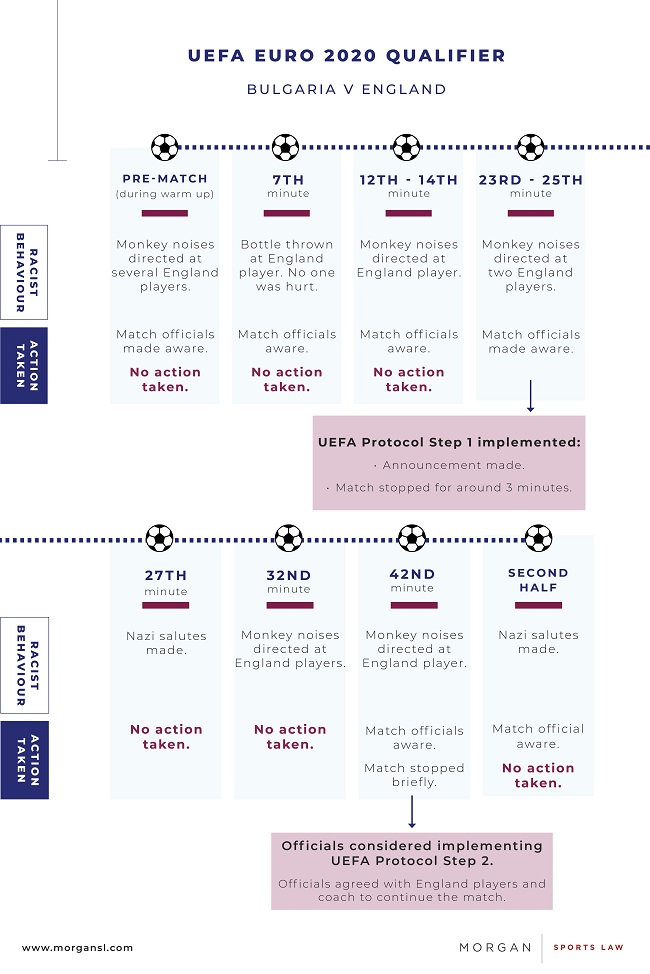
The protocol was not used further, and England won the game 0-6. In the subsequent proceedings before UEFA’s Control and Ethics Disciplinary Body, the Bulgarian Football Union (“BFS”) was ordered to play two UEFA competition matches behind closed doors and fined €75,000 (the “BFS Decision”).
A commitment to the protocol was evident (with England team reportedly being satisfied with the approach taken by the UEFA Match Officials). However, the BFS Decision demonstrates that the UEFA protocol is not ‘three-step’, in practice. In fact, by the time Step 1 of the protocol was implemented, there had already been three racist incidents either reported to, or noted by, the UEFA Match Officials. In another UEFA Euro 2020 Qualifier, Montenegro v England, in March 2019, the protocol was not implemented at all, despite multiple racist incidents. To be effective, however, any protocol must be applied consistently. Further, whilst reporting helps to bring incidents to the attention of match officials, the onus should (predominantly) be on match officials to identify and deal with incidents.
The protocols are not deployed in a ‘zero-tolerance’ manner, which may be the cause of their inconsistent application. The FA’s six-step protocol prioritises “ensuring that the match is not unduly interrupted”, noting “any decision to suspend or abandon the match should be taken by the referee after full consultation with the police and safety officer/home club representative, and after consultation with the team managers and captains”. Similarly, with UEFA, abandonment can only happen “after all other possible measures have been implemented and the impact of abandoning the match on the security of the players and public has been assessed”. Further, UEFA’s Safety and Security Regulations, Guidelines for Match Officials, provide that the protocol will only be used for “serious racist incidents”, “of a strong magnitude and intensity”. As a result, the threat of the ultimate ‘punishment’ of the game being abandoned appears minimal.
Abandoning a match should of course not be taken lightly – for a start, there are important safety considerations to be taken into account. However, ‘zero-tolerance’ can only be conveyed by decisive action, no matter how uncomfortable or unpopular such action may be at the time.
The problem is well-illustrated by a match in September 2019 between Hartlepool United FC (“Hartlepool”) and Dover Athletic FC (“Dover”). Dover players were subjected to racist abuse and sustained booing by spectators, with the situation becoming so toxic that both teams apparently nearly walked off the pitch. Nine months after the incident, the match referee is reported to have said that he “didn't want to be the first ref to abandon a match for racism” and that “if [he] was more confident [he] would have called it off”. Whilst fully appreciating that it must have been daunting for the referee, that does appear to have been a match in which abandonment would have been justified. An opportunity to demonstrate that ‘zero-tolerance’ means exactly that was thus missed.
Curiously, in the subsequent disciplinary decision (which resulted in a fine for Hartlepool), no mention was made of The FA protocol. This suggests that The FA’s protocol is not being treated as the standard to which clubs are held on the question of whether racist incidents have been dealt with effectively, and ultimately that it is not sufficiently embedded into the rules to have any real effect.
One potential reason for the apparent ineffectiveness of The FA’s six-step protocol is that it is considerably more involved that the three-step protocol recommended by FIFA and UEFA. Indeed, those differences have created confusion, as illustrated by the Premier League match between Tottenham and Chelsea, in December 2019. Following reports of a racist incident, the match referee implemented Step 1 of the UEFA protocol – an announcement – when, in fact, he apparently ought to have followed the Premier League protocol (being the same as The FA protocol), which requires instead the identification and potential removal of the person/people responsible while the match continues (with no announcement being made). It is not clear why the referee applied the wrong protocol, but the incident illustrates perfectly why operating inconsistent rules across different levels of football can create confusion.
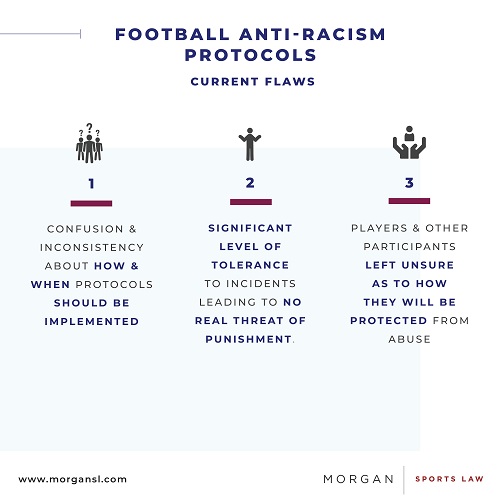
Conclusion
Racist abuse is a longstanding problem in football, and it has become worse in recent seasons, with reports of racism in professional football rising 53% from the 2018/19 season to the 2019/20 season. Football’s governing bodies must step up.
Applying different rules at different levels sends a confusing message to all stakeholders. Crucially, those on the receiving end of abuse will be left unsure as to how they can expect to be protected. Whilst the exact same approach in every league or competition may not be possible, the message should be as consistent as it can be. The simple three-step protocol advocated by FIFA is clear and appears to be as good a starting point as any.
There is also no point in having any protocols if people do not know what they are, or when and how to use them. Therefore, clear communication, at all levels of the game is essential. There should also be continuous dialogue with stakeholders to review and improve on the protocols.
Finally, a ‘zero tolerance’ policy means nothing if referees are not prepared to abandon matches under the circumstances anticipated by the applicable protocols. If football is serious about taking a stand, redressing the balance in favour of suspending, or abandoning a match, as opposed to prioritising the continuation of the game, would be an important start.
Authored By
Donna Bartley
Senior Associate
Footnote
1. The Match Delegate Report, set out in the BFS Decision, states “After the final whistle Mr. [Gareth] Southgate went into the pitch to greet the referee and to say he was satisfied with the way the racist behaviour from the crowd was managed by the officials.”


